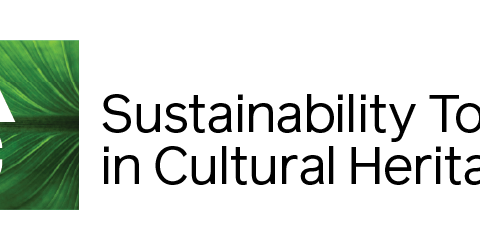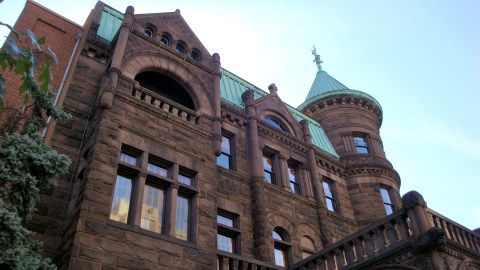This week’s guest blogger, James Leventhal, is Deputy Director for Development at the Contemporary Jewish Museum in San Francisco (follow them on Twitter @jewseum), and serves on the board of the Western Museums Association.
I had the good fortune this past Saturday to listen to Robert Janes, PhD. speak as the centerpiece of this year’s Helzel colloquium presented by John F. Kennedy University’s Museum Studies program in Berkeley, CA.
Janes is an inspiring and eloquent presenter on the importance of the work we all do on behalf of museums. And he has issued a call to action in his new book Museums in a Troubled World (2009)—I recommend it highly to anyone who cares about museums in the 21st century.(You can hear him talk about the book on CFM’s YouTube Channel.)
JFKU’s Museum Studies conference room was full of emerging professionals, professors and young museum studies students. In that setting, how can you not love stuff like this?
“…museums and galleries are potentially the most free and creative work environments on the planet…There are very few other workplaces which offer more opportunities for thinking choosing and acting in ways that can blend personal satisfaction and growth with organizational goals.”
To realize this potential, Janes promotes new models, encouraging museums to be relevant, not imitative, noting
“museums are using existing mental maps while they drift onto the shoals of unthinking imitation, repetition and excess.”
He listed museums that he sees as doing important, relevant work with an eye on reinvention:
• In terms of global consciousness with a focus on climate change and an acknowledgement of crisis-level environmental conditions, The Field Museum in Chicago and Museum Victoria in Manila, which has taken on health issues in the communities they serve
• The Heifer Village museum in Little Rock, run by Heifer International engages audiences around hunger and the need for sustainable practices in a novel way.
To this short list, Adrienne McGraw of California Exhibition Resources Alliance (CERA) added the Pratt Museum in Kachemak Bay, Alaska. Following the massive disaster of the Exxon Valdes, The Pratt Museum took on the cleaning and environmental message as a large part of its defining mission.
And here in the San Francisco bay area, both the Chabot Space and Science Center and the California Academy of Sciences have dedicated a large portion of their mission and physical plant to global consciousness. In this setting, speaking to a forward thinking museum studies program in Berkeley, Dr. Janes was preaching to the choir.
But Janes also asks us to reassess what we do with our collections. He is being credited with starting some of the talk about moving away from museums as collecting institutions. Janes sees collections as “sacred cows,” and says it is time for us “…to talk to the cows.” He writes, “The salient question for museums is whether they can transcend their commitment to the stewardship of collections and embrace broader societal issues?” (p. 27).
For me, the “take aways” were the need to emphasize the importance of staff and increased professionalism of the museum worker, with a focus on collaborative, cross-departmental models and leadership training.As Janes joked, “If you don’t like the marketing person, you are just going to have to deal with it, because they are coming to be part of planning every meeting.”
In this time, when major, mid-sized museums in California are closing (for example, see stories on the Claremont Museum of Arthere and here) the Helzel colloquium really ended up being a tribute to the value of the museum worker.
More commentary on Janes’’ talk, by graduate student Jason Jones, can be found at the westmuse blog








